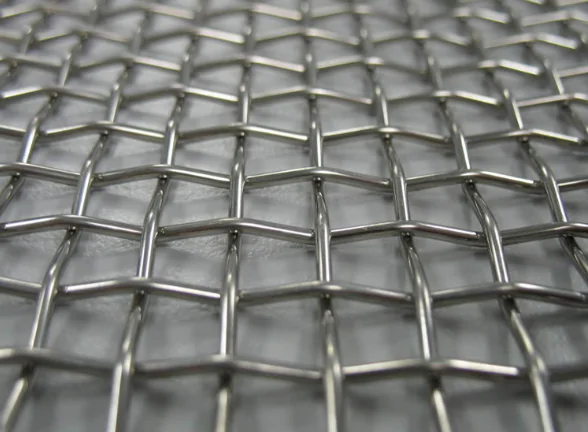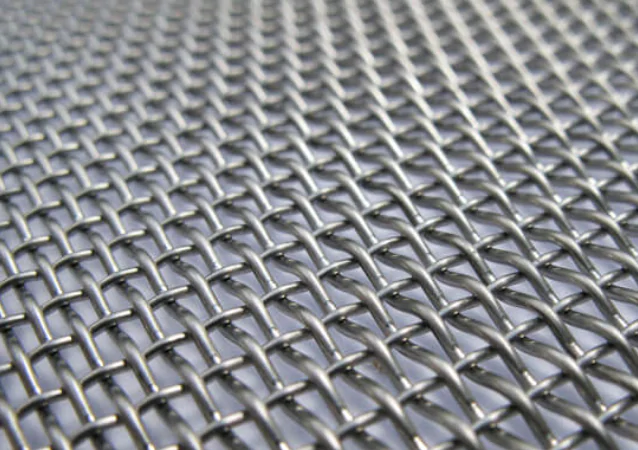Introduction
Stainless steel wire mesh is an essential material for many industries. This guide explains why stainless steel is the ideal material, how it is produced and manufactured, and how to use it in different applications. Learn everything you need to know to make an informed decision.
Know more about the basics of stainless steel wire mesh, its different types, benefits, and how long it will last. Continue reading to determine whether this type of wire mesh is a good fit for your project!
1. What is stainless steel wire mesh

Stainless steel wire mesh is a type of metal mesh fabric made from stainless steel wire woven together. It is commonly used in industrial, commercial, and residential applications due to its strength, durability, and corrosion resistance.
The main properties of stainless steel wire mesh include its tensile strength, corrosion resistance, and low maintenance costs. Its construction consists of weaving strands of metal wire together in a uniform pattern. This creates a strong and durable product that is suitable for a variety of applications.
Stainless steel wire mesh is typically constructed from a woven wire that is formed from a series of interlocking crimped wires. The wires are usually made from a type of stainless steel alloy that resists corrosion and rusting, such as Type 304 or Type 316 stainless steel. The mesh can be woven in a variety of patterns, with different openings and sizes.
The most common type of wire mesh is a plain weave, which is when each wire passes over and under the next wire, forming a uniform pattern of openings. Other types of weaves include twill, reverse Dutch, and basket weaves.
The size of the openings in the mesh is determined by the wire diameter and the number of strands woven together. The mesh is typically finished with a galvanized or vinyl coating to further increase its corrosion resistance.
2. Different types of stainless steel wire mesh

304 and 316 stainless steel wire mesh are both made from austenitic alloys that provide excellent corrosion resistance, strength, and durability. 304 and 316 stainless steel wire mesh are two of the most commonly used materials in industrial wire mesh manufacturing.
The difference lies in the addition of molybdenum in 316 stainless steel. The molybdenum adds to the corrosion resistance, making it ideal for harsh environments, such as those exposed to salt water and other chemicals. It has a high resistance to chemicals, making it suitable for use in chemical processing applications.
It has a low electrical conductivity, making it suitable for use in electrical applications. It has a smooth surface finish, making it suitable for use in aesthetic applications. It has a high level of formability, making it suitable for use in applications requiring intricate shapes.
304 stainless steel wire mesh is better suited for indoor and non-corrosive environments. It is also more economical, making it a great choice for applications where cost is a factor. Both materials are easy to fabricate and offer superior weldability.
It offers good ductility, and good formability, and is easy to clean and maintain. It also has good thermal and electrical conductivity and can be used in temperatures up to 1000°F (540°C). Additionally, it has high tensile strength and good wear resistance.
304 and 316 stainless steel wire mesh are available in a variety of mesh sizes and wire diameters, allowing them to be used for a variety of applications.
3. Benefits of stainless steel wire mesh

Stainless steel wire mesh is a strong and durable material that is rust and corrosion-resistant. It is composed of a tightly woven pattern of thin metal wires, making it extremely durable and able to withstand extreme temperatures and harsh conditions. It is also an excellent material for blocking out pests and small rodents, as it is almost impossible for them to get through the tiny gaps in the mesh.
Stainless steel wire mesh is also incredibly strong, with a tensile strength of up to 33,000 psi, making it an excellent choice for security fencing and other applications that require a strong and durable material.
high strength
The high strength of stainless steel wire mesh is due to its high tensile strength. The tensile strength of the stainless steel wire mesh is determined by its composition and is typically between 1,500 and 2,500 MPa.
The tensile strength of stainless steel wire mesh is one of its most notable features. As a result, it is often used for heavy-duty applications, such as security fencing and anti-theft screens. This strength allows it to withstand considerable force without breaking or bending.
corrosion resistance
Stainless steel wire mesh is a type of corrosion-resistant material that is highly sought after in a variety of applications. The corrosion resistance of stainless steel wire mesh is due to the presence of chromium in the alloy, which forms a protective oxide layer on the surface of the mesh.
This oxide layer prevents the mesh from being corroded by water and other elements, providing a long-lasting and durable solution for both indoor and outdoor applications.
The corrosion-resistance benefit of stainless steel wire mesh is further enhanced by the fact that it is available in a variety of alloys, each with its unique composition that can provide enhanced protection from the elements. Stainless steel wire mesh is also easy to clean, making it a popular choice for applications that require frequent cleaning and maintenance.
4. How long will it last

The elements that may affect the service span of stainless steel wire mesh are:
1. Corrosion
Stainless steel wire mesh is highly prone to corrosion if it is not properly cleaned and maintained. Corrosion can reduce the service life of the wire mesh and cause it to become brittle and break. Corrosion can occur when the stainless steel is exposed to moisture and oxygen, which causes a chemical reaction that can weaken the material.
2. Temperature
Excess temperatures can cause the stainless steel wire mesh to expand and contract, leading to a decrease in the service life of the mesh. When exposed to extreme temperatures, the stainless steel wire mesh will expand and contract, causing it to become loose and weak.
This can cause the mesh to become distorted and eventually break. In addition, the expansion and contraction of the mesh can cause it to become brittle and crack. This decrease in the service life of stainless steel wire mesh can be especially problematic in industrial applications where it is used to separate and contain materials or products.
For example, in the food industry, the mesh is often used to separate ingredients from each other. If the mesh is not able to withstand extreme temperatures, it can result in contamination, which can lead to potentially dangerous outcomes.
3. UV Exposure
Prolonged exposure to UV radiation is known to cause a variety of damage to wire mesh. Over time, UV radiation can cause the wire mesh to fade, discolor and weaken. This can reduce the service life of the wire mesh, as it becomes more brittle and prone to breaking or tearing.
Additionally, prolonged exposure can lead to the development of rust spots and corrosion, which can further weaken the wire mesh and reduce its lifespan.
4. Abrasion
The wire mesh can be easily damaged by abrasion, which can cause the wire mesh to lose its shape and weaken. When wire mesh is damaged by abrasion, it can lose its shape and become weakened. This can have a major impact on the integrity of the wire mesh and its ability to be used effectively.
5. Stress
Too much stress can harm wire mesh, a type of metal mesh made up of interconnected, crisscrossing wires. When exposed to excessive stress, the wire mesh can become brittle and weak, reducing its service life and making it more prone to damage.
When wire mesh is exposed to stress, it can cause the metal to become strained and fatigued. This can lead to the metal becoming brittle and weak, resulting in cracks, fractures, and other damage. When this happens, the wire mesh loses its strength and its ability to handle stress. In turn, this reduces its service life and makes it more likely to fail prematurely.
Stainless steel mesh is a strong and durable material that can last for many years with proper maintenance and care. Generally, stainless steel mesh can last for decades when maintained properly, making it an ideal choice for many applications.
Conclusion
Stainless steel wire mesh is an incredibly versatile material, with a wide range of applications. It is durable, easy to maintain, and cost-effective, making it the ideal material for a variety of projects. With this guide, you can now make an informed decision on the type of stainless steel wire mesh that is best suited for your needs.


